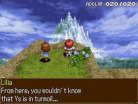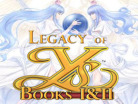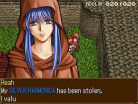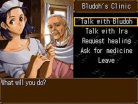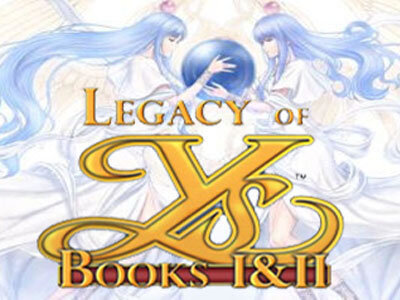- CLASSIC MAGAZINES
- REVIEW CREW
A show recapping what critics thought back
when classic games first came out! - NEXT GENERATION'S BEST & WORST
From the worst 1-star reviews to the best
5-stars can offer, this is Next Generation! - NINTENDO POWER (ARCHIVE)
Experience a variety of shows looking at the
often baffling history of Nintendo Power! - MAGAZINE RETROSPECTIVE
We're looking at the absolutely true history of
some of the most iconic game magazines ever! - SUPER PLAY'S TOP 600
The longest and most ambitious Super NES
countdown on the internet! - THEY SAID WHAT?
Debunking predictions and gossip found
in classic video game magazines! - NEXT GENERATION UNCOVERED
Cyril is back in this spin-off series, featuring the
cover critic review the art of Next Generation! - HARDCORE GAMER MAGAZING (PDF ISSUES)
Download all 36 issues of Hardcore Gamer
Magazine and relive the fun in PDF form!
- REVIEW CREW
- ELECTRONIC GAMING MONTHLY
- ELECTRONIC GAMING MONTHLY RANKS
From Mario to Sonic to Street Fighter, EGM
ranks classic game franchises and consoles! - ELECTRONIC GAMING MONTHLY BEST & WORST
Counting down EGM’s best and worst reviews
going year by year, from 1989 – 2009! - ELECTRONIC GAMING BEST & WORST AWARDS
11-part video series chronicling the ups and
downs of EGM’s Best & Worst Awards!
- ELECTRONIC GAMING MONTHLY RANKS
- GAME HISTORY
- GAME OVER: STORY BREAKDOWNS
Long-running series breaking down game
stories and analyzing their endings! - A BRIEF HISTORY OF GAMING w/ [NAME HERE]
Real history presented in a fun and pithy
format from a variety of game historians! - THE BLACK SHEEP
A series looking back at the black sheep
entries in popular game franchises! - INSTANT EXPERT
Everything you could possibly want to know
about a wide variety of gaming topics! - FREEZE FRAME
When something familiar happens in the games
industry, we're there to take a picture! - I'VE GOT YOUR NUMBER
Learn real video game history through a series
of number-themed episodes, starting at zero! - GREAT MOMENTS IN BAD ACTING
A joyous celebration of some of gaming's
absolute worst voice acting!
- GAME OVER: STORY BREAKDOWNS
- POPULAR SHOWS
- DG NEWS w/ LORNE RISELEY
Newsman Lorne Riseley hosts a regular
series looking at the hottest gaming news! - REVIEW REWIND
Cyril replays a game he reviewed 10+ years
ago to see if he got it right or wrong! - ON-RUNNING FEUDS
Defunct Games' longest-running show, with
editorials, observations and other fun oddities! - DEFUNCT GAMES QUIZ (ARCHIVE)
From online quizzes to game shows, we're
putting your video game knowledge to the test!- QUIZ: ONLINE PASS
Take a weekly quiz to see how well you know
the news and current gaming events! - QUIZ: KNOW THE GAME
One-on-one quiz show where contestants
find out if they actually know classic games! - QUIZ: THE LEADERBOARD
Can you guess the game based on the classic
review? Find out with The Leaderboard!
- QUIZ: ONLINE PASS
- DEFUNCT GAMES VS.
Cyril and the Defunct Games staff isn't afraid
to choose their favorite games and more! - CYRIL READS WORLDS OF POWER
Defunct Games recreates classic game
novelizations through the audio book format!
- DG NEWS w/ LORNE RISELEY
- COMEDY
- GAME EXPECTANCY
How long will your favorite hero live? We crunch
the numbers in this series about dying! - VIDEO GAME ADVICE
Famous game characters answer real personal
advice questions with a humorous slant! - FAKE GAMES: GUERILLA SCRAPBOOK
A long-running series about fake games and
the people who love them (covers included)! - WORST GAME EVER
A contest that attempts to create the worst
video game ever made, complete with covers! - LEVEL 1 STORIES
Literature based on the first stages of some
of your favorite classic video games! - THE COVER CRITIC
One of Defunct Games' earliest shows, Cover
Critic digs up some of the worst box art ever! - COMMERCIAL BREAK
Take a trip through some of the best and
worst video game advertisements of all time! - COMIC BOOK MODS
You've never seen comics like this before.
A curious mix of rewritten video game comics!
- GAME EXPECTANCY
- SERIES ARCHIVE
- NINTENDO SWITCH ONLINE ARCHIVE
A regularly-updated list of every Nintendo
Switch Online release, plus links to review! - PLAYSTATION PLUS CLASSIC ARCHIVE
A comprehensive list of every PlayStation
Plus classic release, including links! - RETRO-BIT PUBLISHING ARCHIVE
A regularly-updated list of every Retro-Bit
game released! - REVIEW MARATHONS w/ ADAM WALLACE
Join critic Adam Wallace as he takes us on a
classic review marathon with different themes!- DEFUNCT GAMES GOLF CLUB
Adam Wallace takes to the links to slice his way
through 72 classic golf game reviews! - 007 IN PIXELS
Adam Wallace takes on the world's greatest spy
as he reviews 15 weeks of James Bond games! - A SALUTE TO VAMPIRES
Adam Wallace is sinking his teeth into a series
covering Castlevania, BloodRayne and more! - CAPCOM'S CURSE
Adam Wallace is celebrating 13 days of Halloween
with a line-up of Capcom's scariest games! - THE FALL OF SUPERMAN
Adam Wallace is a man of steel for playing
some of the absolute worst Superman games! - THE 31 GAMES OF HALLOWEEN
Adam Wallace spends every day of October afraid
as he reviews some of the scariest games ever! - 12 WEEKS OF STAR TREK
Adam Wallace boldly goes where no critic has
gone before in this Star Trek marathon!
- DEFUNCT GAMES GOLF CLUB
- DAYS OF CHRISTMAS (ARCHIVE)
Annual holiday series with themed-episodes
that date all the way back to 2001!- 2015: 30 Ridiculous Retro Rumors
- 2014: 29 Magazines of Christmas
- 2013: 29 Questionable Power-Ups of Christmas
- 2012: 34 Theme Songs of Christmas
- 2011: 32 Game Endings of Christmas
- 2010: 31 Bonus Levels of Christmas
- 2009: 30 Genres of Christmas
- 2008: 29 Controls of Christmas
- 2007: 34 Cliches of Christmas
- 2006: 33 Consoles of Christmas
- 2005: 32 Articles of Christmas
- 2004: 31 Websites of Christmas
- 2003: 29 Issues of Christmas
- 2002: 28 Years of Christmas
- 2001: 33 Days of Christmas
- NINTENDO SWITCH ONLINE ARCHIVE
- REVIEW ARCHIVE
- FULL ARCHIVE
Legacy of Ys: Books I & II
When Ys Book I & II was first released on the TurboGrafx-CD it was considered the first must-own game for NEC's fledgling console. Although it was largely ignored by the U.S. consumer, game critics of the time hailed it as one of the greatest role-playing games ever made. The game's revolutionary cinemas, amazing music and real voice acting (albeit ridiculously awful voice acting) set this game apart from the rest of the crowd, and may have been the reason why a very young Electronic Gaming Monthly handed out their first perfect 10 score to this adventure game.
Unfortunately time has not been kind to the Ys book franchise. Looking back at the TurboGrafx-CD game now, it's hard not to notice the game's weird combat system, the horrendous acting and the fairly generic plotline. Still, if you squint you can see the faint reasons why this game was so revered. Knowing this game's history (and understanding its flaws), I was excited to see if this Nintendo DS remake could remind everybody why Ys Book I & II was considered such a classic. Could they pull it off and make this 20 year old game relevant again, or would this game prove to me once and for all that Ys was a relic of another time?
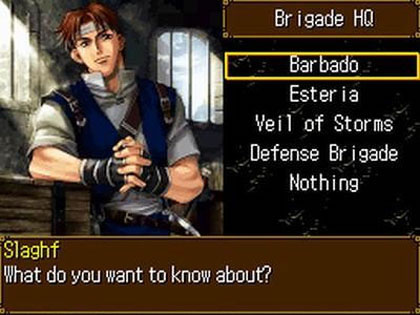
You play Adol Christin, a young, naive swordsman who ends up being talked into questing for six books written about the ancients. These books not only include useful prose about how to live your life thousands of years later, but also where the vanished land of Ys is. If Adol can find these books and gain that knowledge, then he will be an unstoppable force that can destroy the evil forces that are permeating in the land of Esteria. And then the book ends.
Ys Book II (which was released in Japan as a stand-alone game before being ported to the TurboGrafx-CD as a compilation) picks up immediately after the events of Book I. In this book you (still playing as Adol) must go to Ys and unravel the mysteries of the evil forces. Along the way he'll meet some memorable characters and take part in a few epic battles. And if he can survive, then his job will be done and he can go back home. Well, until Ys Book III: Wanderers from Ys.
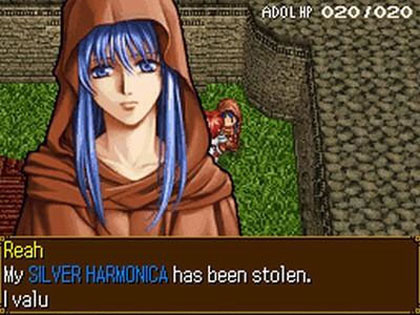
Contrary to other role-playing games at the time, these Ys adventures are not turn-based affairs. This is not one of those Japanese RPGs where you get into a random battle, control a bunch of useless characters and then do it all over again five steps later. Instead Adol feels more like a football player, a man with a sword that has no problem literally running the enemies over. That's right; the way you fight in battle is to run head-first at your foes with your sword and shield, all while jamming the attack button. It's an unorthodox way of resolving conflicts, but it seems to work just fine. Your weapon isn't long, so your best bet is to simply run into the enemy while slashing. Think of Legacy of Ys as a traditional Zelda game ... on crack. Unlike Zelda, every enemy you defeat nets you a few experience points. These lead to leveling up your character, and so on so forth.
The problem with the first two Ys books is that they feel very small. The box advertises that it's two games in one, but that's only because both of these games are insanely short. It won't take you more than a few hours to collect half of the six books, and from there it's just a short journey to the second half. It all happens so quickly, as if we're rushing through the story for some reason. This frenetic style of storytelling ultimately undermines the game's emotional core. At one point a character you've talked to several times is brutally murdered, however instead of the game slowing down to take in this awful situation, you just go on with your business and only two lines are mentioned about this character's untimely death. A lot of role-playing games are criticized for being too wordy, in this case Legacy of Ys isn't wordy enough.
The graphics in these two Ys books are a bit better than their 16-bit TurboGrafx-CD counterparts, but certainly not at the same level as recent remakes by Square Enix (Final Fantasy IV, Dragon Quest V, etc.). Instead we get detailed (albeit simplistic) sprite-based characters, generic looking environments and a lot of repeated enemies. The game does do a number of new tricks, including improved graphical flourishes for boss attacks and other pivotal moments in the game. But those expecting a game with 21st century graphics will be sorely disappointed. At its best, Legacy of Ys looks like the kind of game that could have been done on the Super NES or Sega Saturn.
One thing that has been given the upgrade is the graphics in the various animated cinema scenes. When this game was first released, the poorly animated cut scenes were part of the appeal of the game. People couldn't believe how good the visuals looked, even if they were basically still images with poor voice acting looped over it. In a lot of ways it's like going back and watching those classic Dick Tracy cartoons. The nostalgia may be cool, but it couldn't look any more outdated than it does when compared to Wall-E. These new cinemas attempt to bring the story up to what we expect from a modern role-playing game, and for the most part these succeed. My only real gripe is that there aren't enough of them. The original game was full of these cinemas, but not so much with Legacy of Ys.
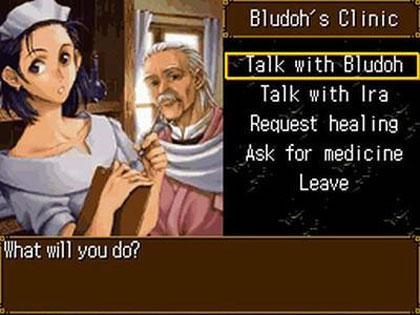
I won't lie to you; part of the appeal for me of the original Ys Book I & II is the obnoxiously horrible voice acting. Released at a time when nobody really understood production values for CD-based games (especially Japanese CD-based games that have to be localized). So, instead of getting talented voice actors to read well-written lines, Ys was notorious for grabbing just about anybody they could find to act out the roles (no matter how bad at acting they were), and then had them read some of the most god-awful dialog you will ever hear in a role-playing game. Some of the lines didn't even make sense. The whole thing felt like it was done over a weekend in some guy's basement.
But as bad as all of that is, it's also endearing. Like the Dick Tracy cartoons of old, the people involved with localizing Ys Book I & II were doing the best they could. How should they know that twenty years later everybody would expect lengthy cinema scenes full of voice acting from real actors? The original voice acting was so bad that it actually improved the otherwise dull storyline. In Legacy of Ys there is no voice acting. When people talk their words are written out. While it would have been nice to hear the same lines performed by real actors, part of me feels that the silent approach is probably the right way to go. It's a shame that the developers didn't flesh out the story a little bit, perhaps giving it a new translation (like so many other recent role-playing remakes).
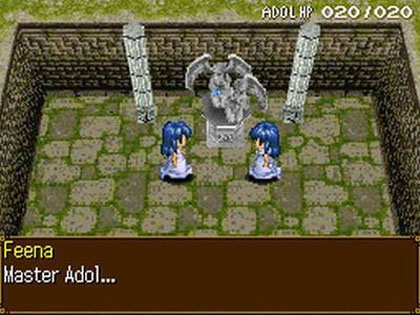
While it's easy to make fun of the original team for giving us such putrid voice acting, there's no debate over the quality of the game's original soundtrack. Composer Yuzo Koshiro's work is without flaw, it's an epic score that I often go back to just to relax. The music in Legacy of Ys is a remix of the original music, which is, for the most part, just as good as what we heard twenty years ago. The game even comes with a cool soundtrack CD, something the original game could have used. All in all, the music is the real star in Legacy of Ys: Book I & II.
When everything is said and done, Legend of Ys is a good way to experience what many consider to be a classic role-playing game. Sadly the game doesn't hold up as well as it should have, but there is a lot to like about this remake. If you're hoping for something more, then perhaps you are better off waiting for the upcoming PSP remake, which will be helmed by many of the people responsible for making the original series. If you've spent the last twenty years wishing you had played Ys Book I & II, then now is your chance. Everybody else will likely be left wondering why this game was so revered in the first place.
HOME |
CONTACT |
NOW HIRING |
WHAT IS DEFUNCT GAMES? |
NINTENDO SWITCH ONLINE |
RETRO-BIT PUBLISHING
Retro-Bit |
Switch Planet |
The Halcyon Show |
Same Name, Different Game |
Dragnix |
Press the Buttons
Game Zone Online | Hardcore Gamer | The Dreamcast Junkyard | Video Game Blogger
Dr Strife | Games For Lunch | Mondo Cool Cast | Boxed Pixels | Sega CD Universe | Gaming Trend
Game Zone Online | Hardcore Gamer | The Dreamcast Junkyard | Video Game Blogger
Dr Strife | Games For Lunch | Mondo Cool Cast | Boxed Pixels | Sega CD Universe | Gaming Trend
Copyright © 2001-2025 Defunct Games
All rights reserved. All trademarks are properties of their respective owners.
All rights reserved. All trademarks are properties of their respective owners.






